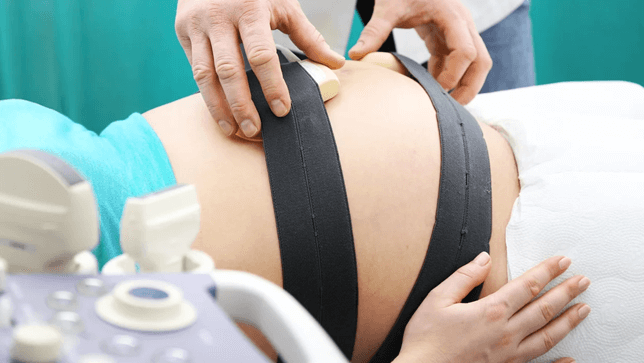Contraction Stress Test (CST)
- CST is a prenatal screening test that measures the FHR in response to uterine contractions

- CST can assess fetal well-being and identify fetal hypoxia or distress
- CST is usually performed after 28 weeks of gestation or earlier if there are risk factors such as diabetes mellitus, hypertension, IUGR, .
- CST involves placing two belts with sensors on the pregnant person’s abdomen: one to monitor the FHR and one to monitor the uterine contractions
- CST requires inducing uterine contractions by either nipple stimulation or intravenous oxytocin infusion
- CST aims to achieve at least three contractions lasting 40 to 60 seconds in a 10-minute period
- CST is interpreted as negative, positive, equivocal, or unsatisfactory
- A negative CST means that there are no late decelerations of the FHR during contractions
- A negative CST indicates adequate fetal oxygenation and normal placental function
- A positive CST means that there are late decelerations of the FHR with at least 50% of contractions
- A positive CST indicates fetal hypoxia and compromised placental function
- An equivocal CST means that there are late decelerations of the FHR with less than 50% of contractions or variable decelerations of the FHR with or without contractions
- An equivocal CST may indicate cord compression, fetal head compression, or mild fetal hypoxia
- An unsatisfactory CST means that there are insufficient contractions or poor quality of FHR tracing
- An unsatisfactory CST requires repeating the test or performing a BPP
- CST has a risk of preterm labor, premature rupture of membranes, infection, bleeding, .
Nursing Test Bank
Quiz #1: RN Exams Pharmacology Exams
Quiz #2: RN Exams Medical-Surgical Exams
Quiz #3: RN Exams Fundamentals Exams
Quiz #4: RN Exams Maternal-Newborn Exams
Quiz #5: RN Exams Anatomy and Physiology Exams
Quiz #6: RN Exams Obstetrics and Pediatrics Exams
Quiz #7: RN Exams Fluid and Electrolytes Exams
Quiz #8: RN Exams Community Health Exams
Quiz #9: RN Exams Promoting Health across the lifespan Exams
Quiz #10: RN Exams Multidimensional care Exams
Naxlex Comprehensive Predictor Exams
Quiz #1: Naxlex RN Comprehensive online practice 2019 B with NGN
Quiz #2: Naxlex RN Comprehensive Predictor 2023
Quiz #3: Naxlex RN Comprehensive Predictor 2023 Exit Exam A
Quiz #4: Naxlex HESI Exit LPN Exam
Quiz #5: Naxlex PN Comprehensive Predictor PN 2020
Quiz #6: Naxlex VATI PN Comprehensive Predictor 2020
Quiz #8: Naxlex PN Comprehensive Predictor 2023 - Exam 1
Quiz #10: Naxlex HESI PN Exit exam
Quiz #11: Naxlex HESI PN EXIT Exam 2
Questions on Contraction Stress Test (CST)
Correct Answer is A
Explanation
No explanation
Correct Answer is B
Explanation
No explanation
Correct Answer is A
Explanation
Identifying fetal hypoxia or distress is not the purpose of the test, but a possible outcome of an abnormal test.
Late decelerations of the FHR with at least 50% of contractions indicate a positive CST result, which means that the fetus is at risk of hypoxia and acidosis.
An unsatisfactory CST result would mean that there are either no contractions in 10 minutes, or less than three contractions in 10 minutes with an uninterpretable FHR tracing.
This would require repeating the test or performing a biophysical profile (BPP) to assess fetal well-being.
Search Here
Related Topics
- Hypoglycemia - Prenatal Diagnostic Tests And Procedures
- Preterm birth - Prenatal Diagnostic Tests And Procedures
- Macrosomia - Prenatal Diagnostic Tests And Procedures
- Post-term birth - Prenatal Diagnostic Tests And Procedures
- Hyperbilirubinemia - Prenatal Diagnostic Tests And Procedures
- Cardiovascular Changes in Pregnancy - Prenatal Diagnostic Tests And Procedures
More on Nursing
Free Nursing Study Materials
Access to all study guides and practice questions for nursing for free.
- Free Nursing Study Trials
- Free Nursing Video tutorials
- Free Nursing Practice Tests
- Free Exam and Study Modes
- Free Nursing Revision Quizlets
